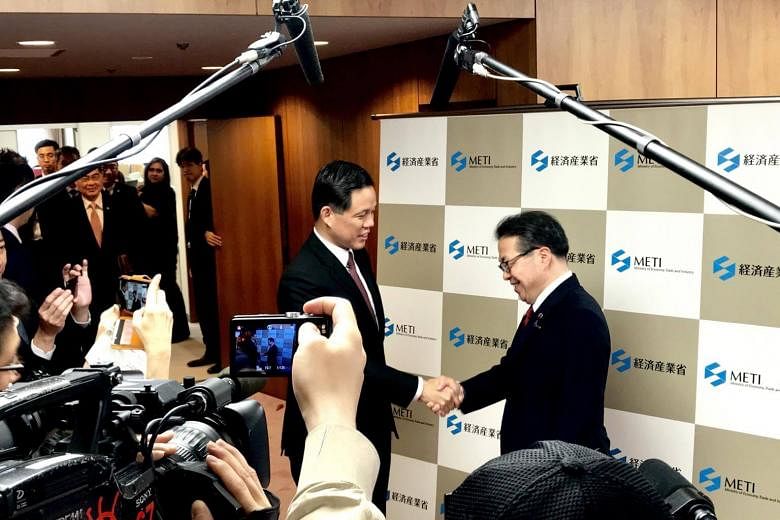Singapore and Japan both hope the Regional Comprehensive Economic Partnership (RCEP) trade agreement will reach "a substantial conclusion" by this year, Trade and Industry Minister Chan Chun Sing said in Tokyo yesterday.
He made the point at the outset of his first bilateral meeting with his Japanese counterpart Hiroshige Seko, since taking over the portfolio from Mr Lim Hng Kiang in May.
Mr Chan, who is in Tokyo on a three-day visit ending tomorrow, will co-chair with Mr Seko today a ministerial meeting for the 16nation trade deal led by Asean.
"We want to move forward our bilateral economic ties, and we will work closely with you, whether bilaterally or multilaterally, to further our common objectives," Mr Chan told Mr Seko.
He was accompanied by Mr Lim, now special adviser at the Ministry of Trade and Industry, as well as Singapore's Ambassador to Japan Lui Tuck Yew.
Likewise, Mr Seko pledged to deepen bilateral economic and trade relations and work with Singapore on multilateral economic frameworks.
These include the RCEP, for which a target has been set to reach an agreement this year - potentially at the Asean summit hosted by Singapore in November - although hurdles still remain.
There is also the revised Trans-Pacific Partnership (TPP) free-trade deal, for which Japan's Parliament passed the Bills required for ratification on Friday.
Japan still has to revise the relevant government ordinances before ratification is finalised. These revisions will likely be completed by early this month, paving the way for Japan to be the second country in the 11-nation bloc after Mexico to ratify what is now known as the Comprehensive and Progressive Agreement for Trans-Pacific Partnership, or the TPP-11.
Revised after the United States pulled out last year, the agreement will come into force 60 days after it is ratified by at least six member countries. Singapore, Brunei, Malaysia, Vietnam, Australia, Canada, Chile, New Zealand and Peru are also parties to the deal.
The TPP-11 has been upheld as the gold standard of multilateral trade deals, while the RCEP is seen to be less rigorous.
Some TPP-11 member countries like Japan and Australia have been pushing for similarly high standards to be applied to the RCEP. But countries like China and India have been more cautious.
Today, trade ministers and officials will gather in Tokyo for the RCEP meeting. Besides the 10-nation Asean bloc, it includes Australia, China, India, Japan, South Korea and New Zealand.
Separately, Singapore and Japan are going through the third review of their bilateral free-trade agreement, which took effect in 2002.

